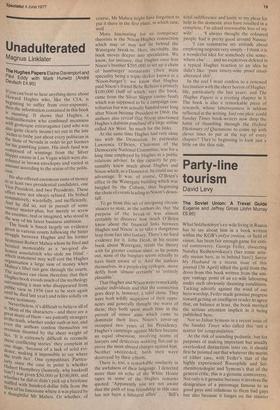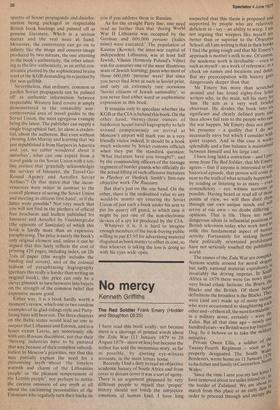Party-line tourism
David Levy
The Soviet Union: A Travel Guide Eugenie and Jeffrey Gross (John Murray 25.95) What Solzhenitsyn's ex-wife living in Russia has to say about him in a book written within the KGB's polya zreniya, or field of vision, has been fair enough game for critical controversy. George Feifer, dissecting Natalya Reshetovskaya's (her name actually means bars, as in behind bars!) Sanya My Husband in a recent issue of this journal (30 April) sifted the gold from the dross from this book written from the uni que vantage point of an ex-wife labouring under such obviously daunting conditions.
Tacking adroitly against the wind of our
hero worship, Fe ifer made genuine progress toward getting an intelligent reader to agree
that, on balance at least, the book merited the serious attention implicit in it being published here.
Not so Julian Symons in a recent issue of the Sunday Times who called this 'not a matter for congratulation.'
At the risk of sounding pedantic, but for purposes of making important but Usually overlooked distinctions later on, it should first be pointed out that whatever the merits of either case, with Feifer's that of the highly experienced Russophile and Solzhenitsynologist and Symons's that of the general critic, this is a genuine controversy. Not only is it genuine because it involves the denigration of a personage famous to us good guys and infamous to them bad guys but also because it hinges on the sinister spectre of Soviet propaganda and disinformation being packaged in respectable British book bindings and palmed off as genuine literature. Which is a serious matter and the real issue at hand. Moreover, the controversy can go on to infinity like the image and counter-image produced by two mirrors, the one attesting to the book's authenticity, the other attesting to the /ese-authenticity, as an artful contrivance planted by the sophisticated brains trust of the KGB demanding its rejection by the non-gullible.
Nevertheless, that ordinary, common or garden Soviet propaganda can be palmed off as authentic information between respectable Western hard covers is amply demonstrated in the ostensibly noncontroversial area of travel guides to the Soviet Union, the most egregious example being the latest. The publisher can supply a single biographical fact, let alone a credential, about the authoress. But even without phoning John Murray and learning that 'we just republished it from Harpers in America and, yes, we rather wondered about it ourselves', what can one expect from a travel guide to the Soviet Union with a tenline preface that 'gratefully acknowledges the services of Intourist, the Travel-GoRound Agency and Aeroflot Soviet Airlines'? Or that states that 'the inconveniences were minor in contrast to the overall pleasure of seeing the Soviet Union and meeting its citizens first-hand', as if the latter were possible? Not very much that you will not find in the plethora of official free brochures and leaflets published for Intourist and Aeroflot by Vneshtorgizdat (the opposite of Samizdat) of which this boa is hardly more than an expensive paraphrasing. The price is surely the book's only original element and, unless it can be argued that this fairly reflects the cost of printing 426 pages, including index, on llb 7ozs of paper (this weight includes the binding and covers), and of the colossal tedium of paraphrasing hagiography (perhaps this really is harder than writing an original book), this price can only be a clever gimmick to turn browsers into buyers on the strength of the common belief that expensive means good.
Either way, it is a book hardly worth a moment's review, which one or two random examples of its glad-tidings style and Partylining hints will bear out. The three chapters on the Baltic states would lead no one to suspect that Lithuania and Estonia, and to a lesser extent Latvia, are notoriously rife with anti-Russian discontent, nor that their 'thriving' industries have to be pictured that way because of their complete subordination to Moscow's priorities, nor that this may partially explain the need for a patronising myth about 'the timeless warmth and charm of the Lithuanian people' or 'the pleasant temperament of the Lettish people', nor perhaps to notice. the curious omission of any myth at all about the enchanting personalities of the Estonians who regularly turn their backs on you if you address them in Russian.
As for the straight Party line, one need read no further than that 'during World War II Lithuania was occupied by the German and 600,000 persons (italics mine) were executed.' The population of Kaunas (Kovno), the inter-war capital of independent Lithuania, was at least half Jewish; Vilnius (formerly Poland's Vilno) was for centuries one of the most illustrious seats of Jewish learning; guess who most of those 600,000 'persons' were! But since you never find Jews as such in Soviet print, and only on extremely rare occasions 'Soviet citizens of Jewish nationality', so you never find either word or euphemistic
expression in this book. •
It remains only to speculate whether the KGB or the CIA is behind this book. On the other hand, twenty-three ounces of hardcover Soviet travel hagiography to heft around conspicuously on arrival at Moscow's airport will mark you as a very friendly visitor indeed. It should be a book much welcome by Soviet customs officials when they put the standard, question: 'What literature have you brought?', and by the commanding officers of the teenage regiment of border guards who officially do the actual lifting of such offensive literature as Playboy or Hedrick Smith's first-rate objective work The Russians.
But that's just on the one hand. On the other, there is the undoubted value to any would-be master spy entering the Soviet Union of just such a book under his arm to put his quarry off guard, in which case it might be just one of the non-electronic devices of a spy kit produced by the CIA.
Whatever it is, it is hard to imagine enough members of the book-buying public willing to pay £5.95 for advertising material disguised as book matter to offset its cost, so that whoever is taking the loss is doing so with his eyes wide open.



































 Previous page
Previous page